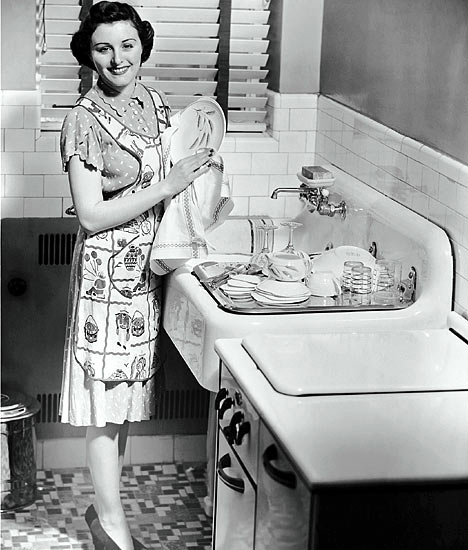It breaks my heart to see the same worn-out ideas about the “woman’s role” parroted over and over again in source after source. During our recent travels a brother gave me an article, “The Godly Woman’s Role & Influence” by Marlin Kreider (Reaching Out, #69, 2011, Living Waters Mennonite Church, pp.5-6). I would like to deal with several aspects of this article in hopes of helping us discern Christ’s will concerning the full-functioning of the brothers and sisters in his body on earth.
The author expresses a desire to find “God’s way of doing things,” but important information is omitted from the Biblical story that does not fit the box that women are put in.
For example, the first point regarding the “role for women” is “submission.” The article gives the impression that submission is specifically a female issue. This distorts Paul’s thought. Paul mentions the submission of wives only after setting forth the beauty of mutual submission of all believers one to another. Submission is first of all a manifestation of the Spirit among those in the ekklesia. In other words, it is just as important for males to be submissive as it is for females. To lift submission out of its body context and primarily connect it to females is to open the door for dangerous distortion and abuse.
Further, the article states that “suitable helper” translates into meaning that a woman “fill a subordinate role under the direction and protection of a godly father or husband.” This position creates some serious problems, for the Hebrew word “ezer” is most often used of the Lord, who is said to be “the helper of Israel.” Doesn’t this show once and for all that “suitable helper” cannot mean a “subordinate role” for the woman? If anything, it would highlight the strength of Eve.
Building on these mistaken assumptions, the article then suggests that
“God never planned for a woman to fill a man’s role. She is out of her God-ordained place when she assumes leadership in the home, the workforce, the church, or the nation. She was not created to be an executive, wear a hard hat, and the like.”
This statement reveals a central issue: an either/or mentality sets up a false alternative – either the woman stays at home and stifles Christ within her, or she expresses Christ outside the home and forsakes her domestic responsibilities. This approach flies in the face of the Biblical narrative.
What about Deborah and Huldah? They were both prophetesses and both expressed their gifts outside the home in the community of Israel. Yet, they were both married, and probably had children (Judges 4:4; 5:7; 2 Kings 22:14; 2 Chron. 34:22). Deborah also functioned as a Judge – “Deborah would sit under the Palm Tree of Deborah, which was between the cities of Ramah and Bethel, in the mountains of Ephraim. And the people of Israel would come to her to settle their disputes” (Judges 4:5).
What about the many women who traveled with Jesus and the male disciples (Luke 8:1-3)? They even supported Jesus and the twelve with their own resources. Shouldn’t they have been dutifully in their homes cleaning, cooking and baking? It was scandalous for a rabbi to have female disciples, and even more scandalous to have them traveling with Jesus’ entourage!
What about Phoebe? She was a deacon in the ekklesia of Cenchrea (Romans 16:1-2). What about Junia? She was outstanding among the apostles as an itinerant worker (Romans 16:7). Why does Paul designate some women as “co-workers,” the same word used for apostolic assistants like Titus and Timothy? Why does the New Testament not have any problem with sisters praying and prophesying in the gatherings of the saints (Acts 2:17-18; 1 Corinthians 11:5)?
As a side note, it is interesting to observe that those who place a heavy emphasis on a woman’s head being covered also usually forbid women to speak in the assembly. But that is the opposite direction from where Paul landed. Paul’s goal was for women to function with praying and prophesying, not to silence them (1 Cor. 11:5, 13).
The view that women are confined to the kitchen is usually linked with the idea that all good believing girls will get married and have children. But under the new covenant singleness is a viable option for men and women (Matthew 19:11-12; 1 Corinthians 7). To put younger and older women under heavy guilt if they do not pursue marriage is to deny the freedom Christ has bestowed upon us.
In Luke 10:38-42 we find a beautiful story that shows us vividly the Lord’s heart. Mary was in the “men’s space,” learning at Jesus’ feet. Martha was carrying out the responsibilities connected to having guests. She was frustrated that Mary was not helping with the preparations, but abiding in the living room with the male disciples. Jesus in no way put down what Martha was doing, but he did make it clear that Mary’s choice to be outside the kitchen was an excellent and acceptable one.
Nothing I have said should be taken as a downplaying or demeaning of motherhood. I am simply trying to bring needed perspective to a view that tightly and narrowly defines the “role” of women in a way that is seriously out of alignment with Christ’s revelation. Deborah held the public position of Judge, she publicly carried out her gifts as a prophetess, and yet she was also a “mother in Israel.”
– Jon Zens
For further reflection:
Karen Campbell’s article, “The Cult of ‘Godly’ Womanhood,” is soon to appear in the Midwest Christian Outreach Journal. Here is a shortened version of this excellent piece: http://www.thatmom.com/2011/07/21/the-sins-of-partiality-and-triviality-and-the-curriculum-that-promotes-them/
Jamal Jivanjee has put together many vital perspectives in his blog-post, “The Universal Enslavement of Women”: http://jamaljivanjee.com/2011/09/the-universal-enslavement-of-women/
Jon Zens, No Will of My Own: How Patriarchy Smothers Female Dignity & Personhood. http://www.amazon.com/No-Will-Own-Patriarchy-Personhood/dp/0982744633/ref=sr_1_1?s=books&ie=UTF8&qid=131899
Jon Zens, What’s With Paul & Women? Unlocking the Cultural Background to 1 Timothy 2. http://www.amazon.com/Whats-Paul-Women-Jon-Zens/dp/0976522292


 Author, speaker, editor of Searching Together, itinerant encourager of relational communities.
Author, speaker, editor of Searching Together, itinerant encourager of relational communities.
Food for thought indeed.
“The lead bird of the V formation is not always an adult male; rather the geese shift their relative positions frequently during the flight.”
Read this today and thought how this is so in sync with your latest blog, Jon. Anyone can read more about, “The Lessons Of the Geese”, here:
http://sybilwonders.blogspot.com/2011/10/this-is-it-this-is-organicsimple-church.html
Jon,
I really appreciate this article–so very needed in our time. I’ve heard so many brothers and sisters (yes, even sisters who have bought the misinterpretation) say how women are to be “submissive” in all things to their husbands — How women are to be strictly obedient to their husbands, no matter what. But looking at it closer, what if a husband is beating his wife? What if he’s using drugs? Is the woman to be submissive and obedient to that? Never! It is completely out of our Lord’s character to suggest that a women live in utter bondage to her husband.
Now, I do like the term “mutual submission.” Because just as many men have controlled their wives, so I have seen women who take control of their husbands. This is equally sad. The freedom of men and women is never a license to control the other party in the name of “freedom.” But “mutual” submission is the key.
It is so good to read your thoughts as a young single brother. It gives me a more accurate and well-balanced view of marriage before I take my vows. 🙂
Great article and very well written.
-Mike
It is past amusing that the author you quote, like many others, without fanfare goes from Paul’s reference to ‘head’ as man of woman, to ‘headship’ as some sort of ‘mantle’ worn by men, to ‘leadership’ which, in its modern conceptualisation appears nowhere in the New Testament, let alone about relationships within the body of Christ. Its even more frightening that some men think that in a marriage they are the ‘leaders’ of the wife. Sheer balderdash. The marriage, whatever its strains, is a partnership of equal adults, submitting to each other.
Thanks for your article.